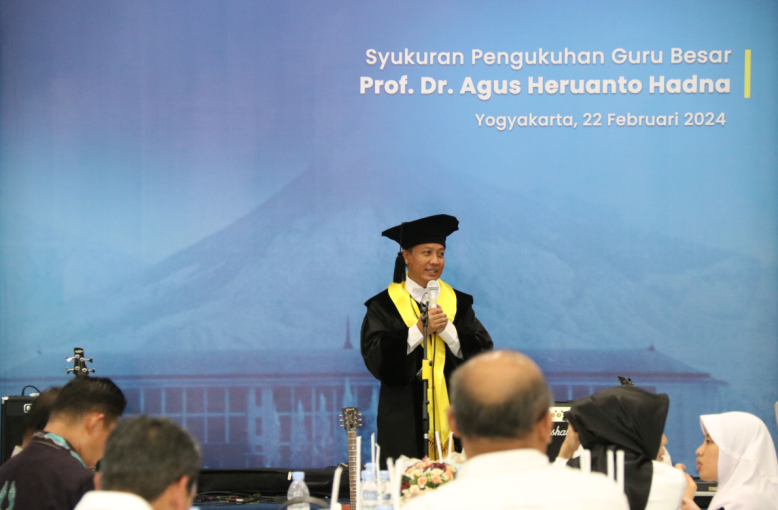
Yogyakarta, February 22 2024—Prof. Dr. Agus Heruanto Hadna, S.IP., M.Sc. Remis was inaugurated as a Professor at the Faculty of Social and Political Sciences, Universitas Gadjah Mada on Wednesday (22/2). All professors, lecturers, rectors and faculties were also present at the inauguration procession which took place at the UGM Senate Hall. Through a speech entitled “Innovation on Inequality and Policy in Social Economics”, Prof. Agus explained his analysis of the development of the digital world and its influence on socio-economic welfare.
The arrival of the digital era is seen as a blessing as well as a worrying future challenge. The government has budgeted a large amount of the APBN and various programs to support digitalization in the last ten years. The allocation takes the form of improving digital supporting infrastructure, developing digital-based education, and fostering digital-oriented MSMEs. Even though digitalization offers the convenience and speed of information without the limits of distance and time, on the one hand, it creates increasingly large disparities and gaps.
According to Prof. Agus, digital development needs to be supported by the emergence of digital technology-based innovations. “Attention to policy innovation in the technology sector is indeed considerable, but it seems that it is still supported by a small amount of funding. If measured from Research and Development (RnD) funding from GDP. “In the case of Indonesia, it turns out that RnD funds are mostly sourced from the public sector,” he explained. Prof. Agus also said that 39% of funds came from GDP, 35% from higher education institutions, and only 26% from the private sector.
The emergence of innovation publications in the policy and digital sectors is somewhat uneven. Based on data from Prof. Agus, the spread of this innovation is only on the islands of Sumatra, Java, and parts of Sulawesi. Meanwhile, the islands of Papua and Kalimantan still need more support. This inequality can indicate various things, such as unequal RnD funding, to a lack of equal distribution of educational development. Prof. Agus also regretted that Indonesia’s RnD publication ranking in ASEAN countries was even below the Philippines, Vietnam, and Singapore.
“A total of 1975 articles were found from 2000-2023, and the most were in 2023. The five keywords most frequently used by the authors were income inequality, social innovation, Covid-19, economic growth, and sustainability. “It turns out that the topics that emerged a lot in those years were, of course, the Covid-19 pandemic, gender issues, and Artificial Intelligence,” said Prof. Agus.
Next, Prof. Agus also explained several important factors that influence policy innovation. Three of them are institutional factors, political systems, and budget support. Institutions such as corporations that are continuously forced to carry out capital extraction and are not accompanied by sustainable innovation will have negative impacts in the future. The same thing also comes from the political system. Prof. Agus also expressed concern about the current political conditions being developed.
“A political system that is open to public participation is also considered an important foundation for realizing policy innovation. Along with increasing community participation as active partners in decision-making. I am worried that the political system we are building will turn backwards, like the pre-reform era. “Then policy innovation will only be a set of instruments of power, the definition of success is only within the realm of the authorities,” said Prof. Agus.
The urgency of the emergence of policy innovation in facing the digital era is considered an important element in balancing progress with the welfare of society. As stated in the Sustainable Development Goals (SDGs) point 4, namely quality education, proves the crucial position of the education sector in overseeing the country’s sustainable growth rate.
